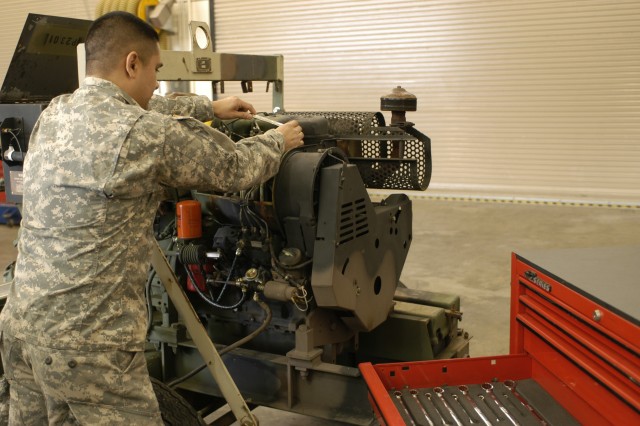FORT CAMPBELL, Ky. (USASOC News Service - January 23, 2007) - An engineer shop's tool box and work area are only as good as the Soldiers who put them to use on the job.
Soldiers in the 160th Special Operations Aviation Regiment (Airborne), Headquarters and Headquarters Company's Motor Pool Engineer Shop prove they are up to the task every day.
Responsible for keeping the unit's machinery-based equipment functioning, the shop is comprised of Soldiers in three military occupational specialties: 63Js (quartermaster and chemical equipment repairmen), 52Cs (utilities equipment repairers) and 52Ds (power generation equipment repairmen.)
These Soldiers maintain a variety of equipment. Some of the equipment they work on is standard Army and civilian machinery that many people recognize, like generators and generator light sets, air conditioning and heating units, air compressors and tires. But there are a great deal of unit specific equipment and requirements as well.
One such example' "Our shop maintains the high volume fuel pumps used to refuel the aircraft on training missions and in combat," said Sgt. Vance E. Crook, a 52D, who is the non-commissioned officer in charge of the engineer shop.
To get their job done, these Soldiers work in a 20,000 square foot state-of-the-art facility that is just three years old. The building features 12 bays, the only tool room of its kind in the Army and even a vehicle lift.
"I have never worked in a motor pool like this one," said Sgt. Frank Avila, a 63J in the 160th HHC Motor Pool Engineer Shop who had four previous assignments before volunteering for the 160th. "I have a new building to work in and an excellent toolbox to work out of."
The building is all-inclusive for the motor pool personnel. "The size and design make for a better working environment," Avila said. "The bays are nice and big, we have our own break room and our own wall lockers right here in the building."
"The unit put a lot of time and money into the facility," Crook said. "It gives Soldiers quick, direct access to the tools they need so it's good for work production."
In addition, each Soldier in the engineer shop is issued his own top-of-the line tool box. The tool box is impressive because each box has a complete set of tools that Soldiers need to work in the bays, said Crook. That includes specialty tools like an impact wrench that you would typically only find in a motor pool's tool room and must be shared by all the personnel. The unit also has identical fully stocked toolboxes the Soldiers used when deployed.
These Night Stalkers are ready to provide their expertise in any location and under any circumstances, which is why every Soldier in the engineer shop is airborne qualified.
"Our section operates and maintains the fuel pumps in the regiment's airborne forward arming and refueling point (FARP) mission and we are 100% on jump status," said Crook.
The Soldiers may be part of an airborne operation and jump in after the equipment is air dropped or in some circumstances they will manually offload the equipment at a forward location from an aircraft on the ground.
"The FARP mission is definitely something different and new from my responsibilities in previous assignments," Avila said.
Job Training
The regiment places great emphasis on training Soldiers how to work on the various equipment and systems found in the unit. The capabilities are only beneficial if they are properly maintained. So 63Js, 52Cs and 52Ds have the opportunity to attend many non -standard Army schools like the mule and gator vehicle courses, said Crook. There are also slots for Army schools and courses including for Airborne, Air Assault, Survival, Evasion, Resistance and Escape (SERE), Dunker and Wheel Vehicle Recovery.
In addition, Crook said the engineer shop has in-house training aids for mechanic Automotive Service Excellence (ASE) Certification. Soldiers can take the certification class at an Army education center on their installation.
What it takes
The pace and requirements of this job in the 160th demand a Soldier who is up to the challenge and is willing to share his knowledge and experience with others to best get the job done and support the mission.
"In prospective Soldiers I look for a willingness to learn new skills so we can teach the technical skills needed for this unit," said Crook. "The prospect also needs to posses the ability and maturity to deploy by himself (as the only engineer shop Soldier in support of the unit mission) and maintain his physical fitness, military bearing, and a positive attitude."
Avila offered reflections about serving in the 160th for Soldiers who are considering their options for future assignments.
"The 160TH SOAR (A) is a great place for a 63J to work in because it offers a change of pace," explained Avila. "It would give a 63J a chance to learn more about equipment that he would not have in any other unit.
I have gained valuable technical knowledge that I will be able to use in the civilian world as a technician," he said. "It has also allowed me to grow professionally as a non-commissioned officer and as a Soldier."


Social Sharing